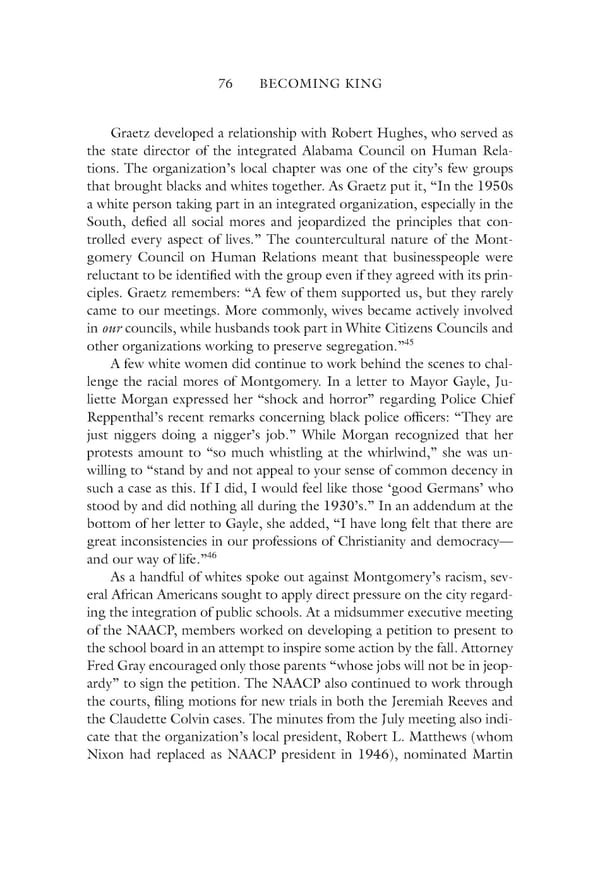76 BECOMING KING Graetz developed a relationship with Robert Hughes, who served as the state director of the integrated Alabama Council on Human Rela- tions. The organization’s local chapter was one of the city’s few groups that brought blacks and whites together. As Graetz put it, “In the 1950s a white person taking part in an integrated organization, especially in the South, defied all social mores and jeopardized the principles that con- trolled every aspect of lives.” The countercultural nature of the Mont- gomery Council on Human Relations meant that businesspeople were reluctant to be identified with the group even if they agreed with its prin- ciples. Graetz remembers: “A few of them supported us, but they rarely came to our meetings. More commonly, wives became actively involved in our councils, while husbands took part in White Citizens Councils and 45 other organizations working to preserve segregation.” A few white women did continue to work behind the scenes to chal- lenge the racial mores of Montgomery. In a letter to Mayor Gayle, Ju- liette Morgan expressed her “shock and horror” regarding Police Chief Reppenthal’s recent remarks concerning black police officers: “They are just niggers doing a nigger’s job.” While Morgan recognized that her protests amount to “so much whistling at the whirlwind,” she was un- willing to “stand by and not appeal to your sense of common decency in such a case as this. If I did, I would feel like those ‘good Germans’ who stood by and did nothing all during the 1930’s.” In an addendum at the bottom of her letter to Gayle, she added, “I have long felt that there are great inconsistencies in our professions of Christianity and democracy— 46 and our way of life.” As a handful of whites spoke out against Montgomery’s racism, sev- eral African Americans sought to apply direct pressure on the city regard- ing the integration of public schools. At a midsummer executive meeting of the NAACP, members worked on developing a petition to present to the school board in an attempt to inspire some action by the fall. Attorney Fred Gray encouraged only those parents “whose jobs will not be in jeop- ardy” to sign the petition. The NAACP also continued to work through the courts, filing motions for new trials in both the Jeremiah Reeves and the Claudette Colvin cases. The minutes from the July meeting also indi- cate that the organization’s local president, Robert L. Matthews (whom Nixon had replaced as NAACP president in 1946), nominated Martin
 Becoming King: Martin Luther King Jr. Page 96 Page 98
Becoming King: Martin Luther King Jr. Page 96 Page 98